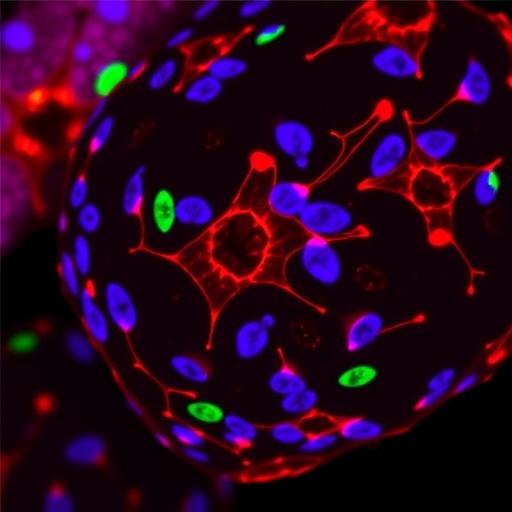Recent research has unveiled a notable advancement in the understanding of bladder cancer progression, focusing specifically on the role of a genetic component known as CCDC137. This molecule has come into the limelight due to its intricate relationship with the mechanisms that contribute to the malignancy of bladder cancer. Bladder cancer remains a significant health concern globally, with numerous strategies being explored to combat its aggressive nature. This new investigation offers a promising avenue for targeted therapies that could enhance patient outcomes.
The study conducted by Zhang et al. introduced groundbreaking findings that suggest the knockdown of CCDC137 results in the suppression of bladder cancer development. The meticulous analysis conducted by the research team highlights the potential of this genetic factor as a therapeutic target. By modifying the expression levels of CCDC137, researchers noted a consequential decrease in tumor growth rates, underscoring its critical role in the cellular pathways that fuel the disease’s progression.
Prior studies have often emphasized the complexity of cancer biology, demonstrating that various genes and their products interact in multifaceted ways to regulate cellular behavior. CCDC137’s involvement in these processes represents a novel insight, particularly in how it intersects with fatty acid metabolism through the modulation of stearoyl-CoA desaturase (SCD). This connection is significant, as SCD has previously been implicated in various cancers and is recognized for its role in promoting lipogenesis, which is essential for cellular proliferation and growth.
Understanding the interplay between CCDC137 and SCD opens new doors for therapeutic intervention. By downregulating SCD through the suppression of CCDC137, researchers discovered a notable reduction in key markers associated with bladder cancer survival and invasiveness. This correlation indicates that the manipulation of these biomolecular pathways could prove beneficial in the therapeutic landscape, especially for patients battling advanced forms of the disease.
Further investigations into the specific molecular mechanisms that underpin the interactions between CCDC137 and SCD will be vital for the broader application of these findings. The research emphasizes a need for additional studies to unravel the precise pathways that may be influenced by the knockdown of CCDC137. Understanding these pathways will not only elucidate the role of CCDC137 in bladder cancer but also potentially in other malignancies that share similar metabolic dysregulations.
In addition to elucidating the functions of CCDC137 and SCD, the study also sheds light on the inflammatory microenvironment often associated with tumor development. The researchers speculate that CCDC137 may play a role in modulating inflammatory signaling pathways, which in turn could influence tumorigenesis. This perspective aligns with ongoing research trends that explore the relationship between chronic inflammation and cancer, further reinforcing the complexity of tumor biology.
The implications of these findings extend beyond bladder cancer, suggesting that the mechanisms by which CCDC137 influences cellular metabolism may be relevant to a wider array of cancers. As researchers delve deeper, there is potential for identifying biomarkers that could predict tumor aggressiveness or responsiveness to various therapeutic strategies. Such advancements would be invaluable in personalizing treatment approaches and enhancing patient care.
The ongoing quest for more effective treatments for bladder cancer has reached a pivotal point with these findings. The integration of genetic research into clinical practice presents a promising frontier for oncologists and researchers alike. By focusing on the molecular underpinnings of cancer progression, the medical community stands poised to make informed decisions regarding patient management, ultimately leading to improved survival rates and quality of life.
Moreover, this exploration into genetic knockdown strategies foreshadows a paradigm shift in how cancers are treated. Specifically, the concept of targeting genetic components like CCDC137 provides a fresh blueprint for future drug development. Establishing robust clinical trials to test therapeutic agents that modulate CCDC137 expression could be the next step in capitalizing on the insights provided by Zhang et al.’s study.
As the research community continues to scrutinize the linkage between genetic factors and cancer biology, the potential for discovering novel therapeutic targets is both exciting and hopeful. Coupled with advancements in personalized medicine, this work enriches our understanding of how to combat malignancies at their core rather than merely managing symptoms. The possibility of developing targeted therapies that enhance the body’s natural defenses against tumors cannot be overstated.
In conclusion, the groundbreaking study led by Zhang and colleagues marks a significant leap forward in the field of cancer research. Through their detailed examination of CCDC137 and its effects on SCD and bladder cancer progression, they have unearthed new perspectives that could pave the way for innovative therapeutic interventions. As researchers build upon these findings, the broader implications for cancer treatment are bound to inspire the direction of future studies and clinical applications. The quest for effective bladder cancer therapies is ongoing, but with each advancement, there is renewed hope for improved outcomes for patients affected by this challenging disease.
Subject of Research: The role of CCDC137 in bladder cancer progression and its relationship with stearoyl-CoA desaturase (SCD).
Article Title: CCDC137 knockdown suppresses bladder cancer progression by downregulating SCD.
Article References: Zhang, H., Huang, W., Cai, Z. et al. CCDC137 knockdown suppresses bladder cancer progression by downregulating SCD. J Transl Med 23, 1013 (2025). https://doi.org/10.1186/s12967-025-07033-w
Image Credits: AI Generated
DOI: 10.1186/s12967-025-07033-w
Keywords: CCDC137, bladder cancer, SCD, tumor progression, genetic knockdown, molecular biology, cancer therapy, personalized medicine.




